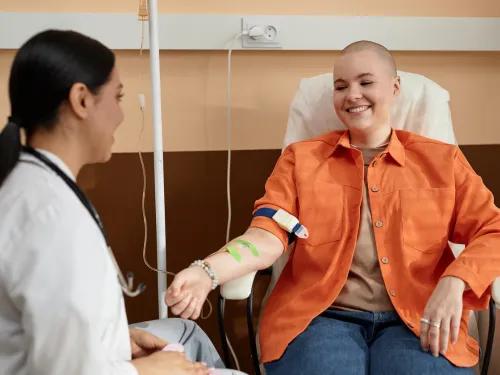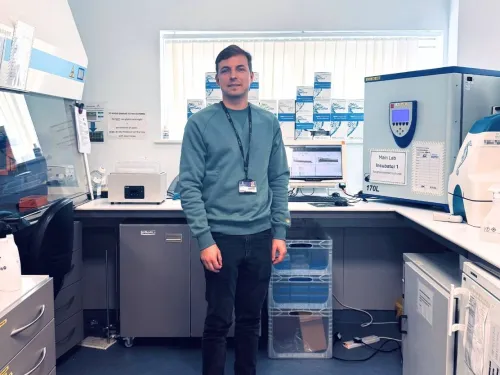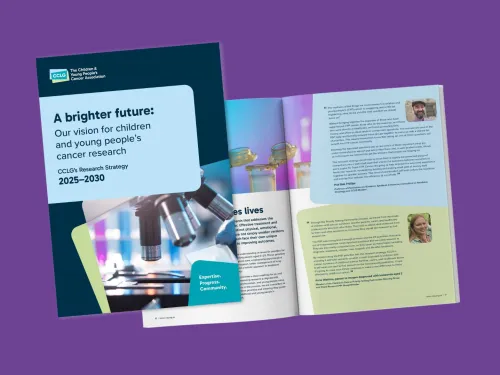In many cultures, talking about death and dying is taboo – but why?
I met with Lois Ruda and Tom Thorpe, who are Youth Support Coordinators and members of the CCLG Palliative and End of Life Care Special Interest Group, which brings together people working with teenage and young adult patients who have a terminal diagnosis. They are keen to share the importance of these difficult conversations…
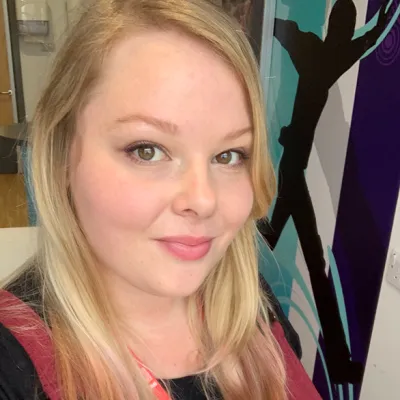
Lois Ruda

Lois Ruda
Teenage Cancer Trust Youth Support Coordinator
I am a Teenage Cancer Trust Youth Support Coordinator based in Leicester. I work with 13 to 24-year-olds with a cancer diagnosis and offer psychosocial support during their treatment and up to two years afterwards.
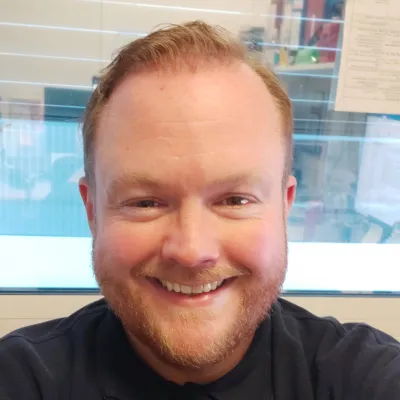
Tom Thorpe

Tom Thorpe
Outreach Youth Support Co-ordinator
I am an Outreach Youth Support Co-ordinator funded by, and working across, the North Thames Network. I am based at UCLH, but I also cover all the trusts across the North Thames and Essex region. I work with predominantly 18 to 25-year-olds.
Why did you choose to work in supporting young people?
Lois: Being a Youth Support Coordinator (YSC) is not something I always wanted to do, but I've really found my niche within teenage and young people's cancer care. I just wanted to do something where I can help people, especially marginalised groups.
Tom: I’ve always worked with young people - I was an outdoor instructor when I left university, then a teacher for 10 years, and later became a Youth Support Coordinator. I have often found a kinship with young people, and that helps me understand where they're coming from.
You both recently spoke at the CCLG Annual Conference. Could you tell me about that?
Lois: We were approached to give a presentation at the conference in March, and Tom had already done an interview with a young person about dying. It really resonated with me - usually if you hear interviews like that, it’s a bit more clinical, a bit more ‘sciencey’.
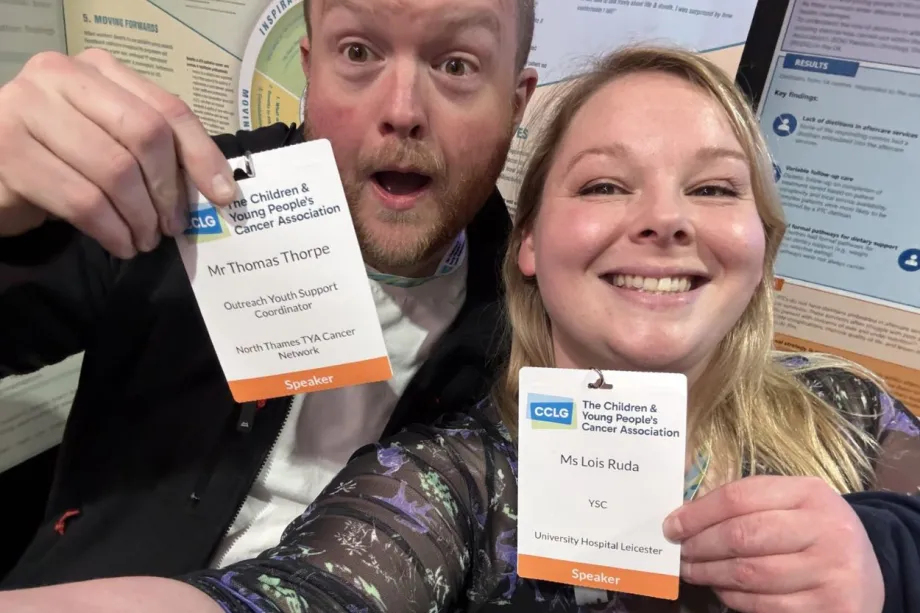
Lois and Tom at the CCLG Annual Conference.
Tom: It all came from a personal interest - I used to listen to Griefcast, a podcast where celebrities talk about their grief. It always struck me that it came from the perspective of the grieving person. I thought, wouldn't it be interesting if we could hear the perspective of someone facing their own end of life?
After a while, I interviewed a young woman that I'm working with. It felt very cathartic, and it was really honest, really open - funny even. There was a lot of levity and a lot of light moments.
Lois: So, Tom and I did some more interviews for our talk at the conference. It has been a process to gather patient voices from people with an uncertain diagnosis or in a palliative end-of-life situation. We try and ask some carefully crafted questions, but we also give them free space to talk about whatever they want as well within it.
A lot of the time, it's almost therapeutic for them to have this completely unguarded space to talk about their prognosis, their death, what it feels like, how they want to be remembered, how they don't want to be remembered, good things, bad things…Lois
We just wanted that very raw, unfiltered, honest kind of feedback, to bring the voices of young people to the CCLG conference.
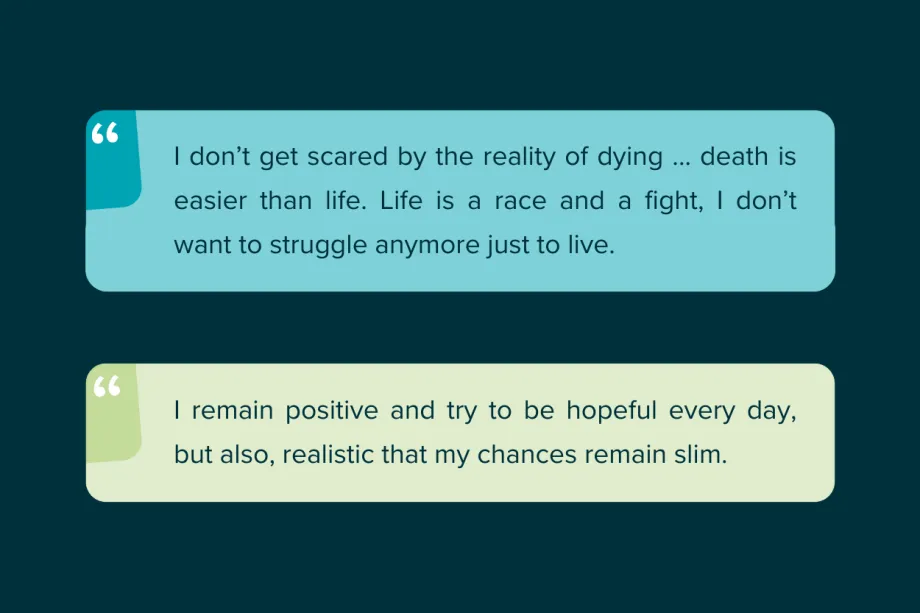
Quotes from young people around the theme ‘Control’.
Why is talking about death important?
Lois: There's such a taboo on the topic of death and dying, even within the medical community. Medical professionals can use phrases like ‘we can't cure you’ or ‘all we can do is manage’. Those are very woolly phrases. At some point, someone's going to say ‘dying’ or ‘death’ and the patient will be shocked - ‘what do you mean I'm dying? We're just managing it.’ When we use plain language, it’s harder to confuse people.
I've always been quite fascinated with death and dying. When you work within this field, you start to wonder what you would want in that situation. I forget that these aren't normal conversations to have.
To me, the beautiful deaths are where the person’s wishes have been followed. If you can see that person's beliefs, wishes, thoughts, processes, and personality within their death, you know it's been done right.Lois
But unless you have conversations about it, that can’t happen - even if the conversation is just that they don't want to talk about it. If they don't want to talk about it, at least they've had the opportunity.
If you had one bit of advice for teenagers and young adults going through cancer, what would it be?
Lois: I think the most important thing you can do is to maintain a sense of self, because cancer will strip away everything, and it can reduce you down to the diagnosis.
When I introduce myself to my young people, I tell them that I'm there for them and not for their diagnosis. I'm there to figure out who they are as a person and to try and keep that person in place.Lois
The most difficult choices we see are where a person hasn't had the chance to talk or doesn't want to talk, and then everyone's got to make a choice for them. That can be tricky, and no one ends up feeling good about the choices that are made. If you can keep a sense of self and advocate for yourself and your wishes, it gives a sense of peace and purpose to that whole journey.
Tom: My advice would be to find the person you trust and feel safe with and talk to them. They might not necessarily be someone you’d expect, and that is quite often a good thing. If they have a degree of separation, you can be more honest about how awful things feel without fearing offence or upsetting them.
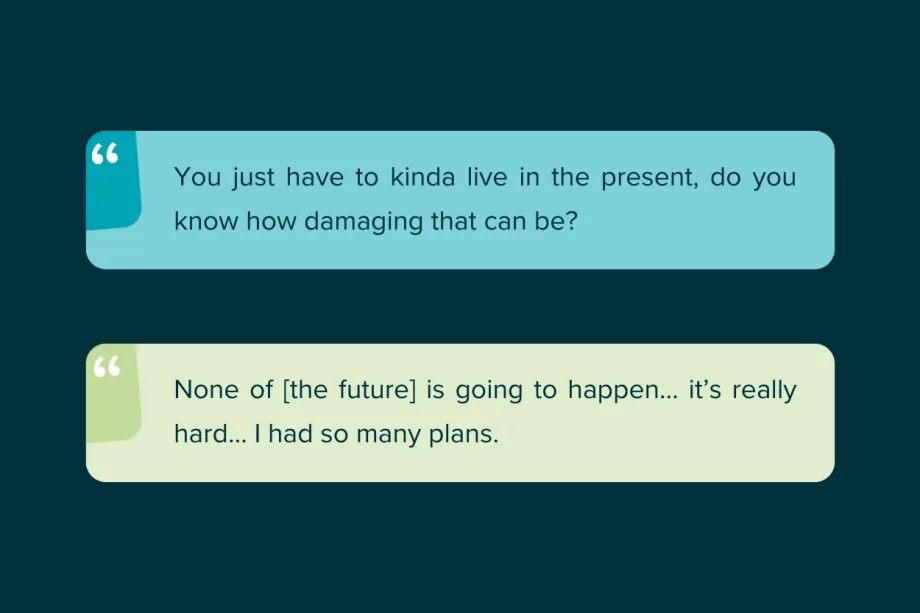
Quotes from young people around the theme ‘Limbo’.
People aren’t always going to talk to you about it, so you might have to take the initiative. Own the narrative and let them know that you can still laugh and make jokes if you want to. This is a rare situation to be in, so most people have no experience and don’t want to get it wrong. Show them that saying nothing is often worse than saying the wrong thing.
Finally, just know that both good things and bad things have an end.
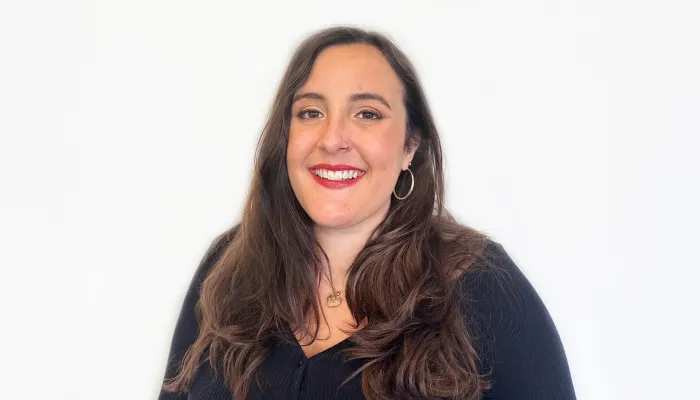
Ellie Ellicott is CCLG’s Research Communication Executive.
She is using her lifelong fascination with science to share the world of childhood cancer research with CCLG’s fantastic supporters. You can find Ellie on X: @EllieW_CCLG


